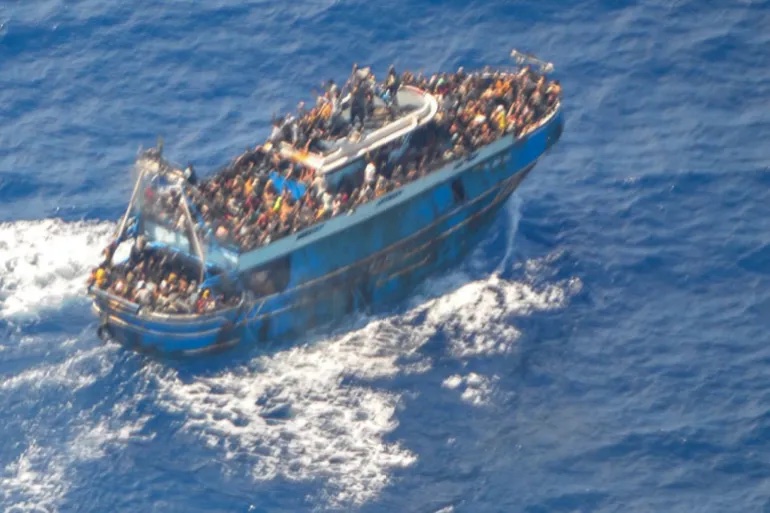A Journey of Perseverance as Migrants Take on the Sea in Search of Safety
By: Yaara Aleissa / Arab America Contributing Writer

A survival exit
Where do you turn when you can’t recognize your own country because it failed to provide the safety and security you need to plan a future? To even think about tomorrow.
Escape. It becomes a necessity not just a luxurious getaway. Words mean different things in different places. Like boat.
The boat rocks back and forth. Water may splash on its visitors upon entry. They walk with careful steps. This is normal for a boat ride. However, in the matter of escape these boat rides look and feel different.
On June 9th migrants from Egypt, Syria, Pakistan, Afghanistan, and Palestine boarded an old steel fishing boat. This boat was not equipped to provide the safe necessities required for over 700 passengers that began their trip from Libya to Italy.
The boat was filled with men, women, and children alike who were crammed into every corner utilizing the space at the cost of their comfort. Then on the route, the boat capsized.
Staying afloat
One of the survivors who is temporarily residing in an encampment in Athens, 24-year-old Ayad from Syria, recalled the moments that broke down once the boat turned. A rope was attached to the prow in an attempt to gain control but it only caused the boat to rock back and forth until finally it was fully capsized. Then came the fall.
He remembers the feeling as “child-like” where you no longer have any control. Ayad tried to grip onto anything to keep afloat and keep his head above water. Luckily his efforts were enough to keep him afloat until help arrived.
In an interview with The Times he describes the waiting which was immensely frustrating. The Greek coastguard did not send for help until three hours after the boat had capsized. In his interview, he contradicts some of the statements made by officials and news media.
“They just watched. They could have saved so many more,” a testimony Ayad gave alongside four other survivors that had been interviewed.
Two of Ayad’s friends whom he was traveling with did not survive. Currently, the survival count has reached 104. 78 have been confirmed dead while the remaining are assumed to be bodies in the water as the search continues.
Limited options
In a state of war, there becomes very little to think about except survival, especially when there is a child in the picture. It makes families willing to sacrifice the little they have left and face the battle of the sea. Hearing stories of survivors that have made it to the other side, beginning to build a new life. It makes one hopeful that the same is available for their family.
While families are aware of the risks they are not always offered the full picture. One of the survivors who spoke with PBS explained that his family had paid $6,000 each for their tickets. The organizers of the trip had told them there would be a capacity of 500.
“What is this? Are they cattle or humans? How can they do this?” Mohamed Abdi Marwan said.
This tragedy is unfortunately in a line of many. In 2016, a Nigerian widow spoke with Time about her experience of escaping by boat. With two small children that had never seen the water until that moment of boarding.
“I heard from others that a lot of people perish. I told my children, but I also told them that the only way to get a good education is to go to Europe. And they agreed.”
These journeys are ones that migrants make with a heavy heart. As the death toll continues to rise and bodies remain unfound it is important to recognize what brings them to come to this point. Beginning to address the faults and providing other methods that allow migrants to safely come in as immigrants. With the proper support and care they need.
Check out Arab America’s blog here!








